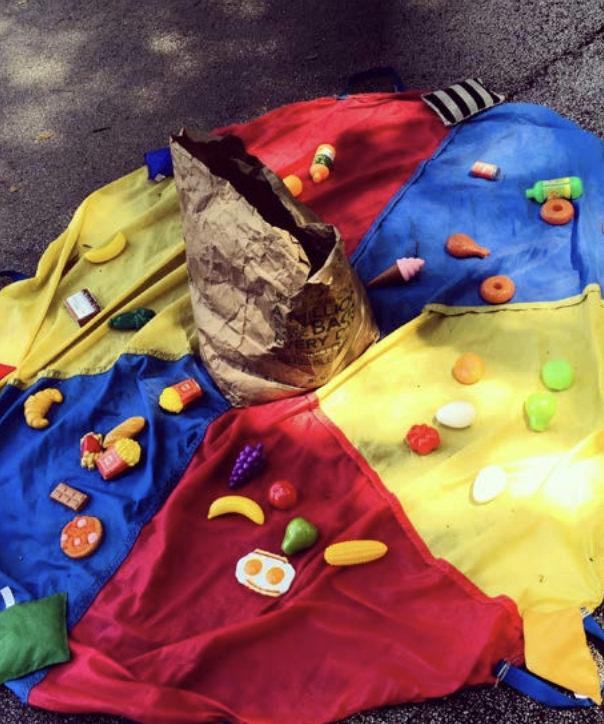Equipment
- Toy food set consisting of healthy foods and junk food; the more sets the better (these sets can be found in the toy section of most big-box stores).
- Large blanket.
- One paper grocery bag.
Setup
- Mark the start point (Position 1) at one end line of a large area (at least 20 meters by 20 meters).
- Mark the paper bag containing food (Position 2) at the midpoint of the game-play area.
- Mark the picnic blanket (Position 3) at the far end of the 20-meter space. Reserve one half of the blanket for “healthy food” and the other half for “junk food.”
- Divide the players into two or more teams, depending on the class size.
Warm-Up
- Kids line up facing the trainer, while the trainer pulls pieces of food from the bag (a child can also be assigned to do this).
- As the pieces of food are pulled from the bag, the kids perform predetermined movements, depending on whether the food is “healthy” or “junk.” The movements can be varied for optimal warm-up time.
Game Play
- On “3, 2, 1 … go,” one player from each team sprints to the bag, reaches in without looking and pulls out one food item. He then runs to the picnic blanket and places the food on the correct side of the blanket, depending on whether it is a healthy food or a junk food.
- The same player then does a predetermined movement (burpee, squats, etc.), sprints back to the start, and tags another player. To make it harder, the other players can hold a plank while waiting for their turn.
Notes
 The game time can be fixed, or the game can run until all the food has been placed on the blanket. Consider the age and number of players when deciding how to run the game.
The game time can be fixed, or the game can run until all the food has been placed on the blanket. Consider the age and number of players when deciding how to run the game.- After the game ends, the trainer reviews the foods on the picnic blanket, confirming that they have been placed on the correct side (incorrectly placed food earns a one-burpee penalty). This can lead to a discussion about each food’s characteristics, as well as its impact on the body: Chicken is a _______? (protein) It helps your body build ________? (muscle). Repetition of the same questions and answers can help kids understand the effect that different foods have on their body.
- This game also provides an opportunity to teach proper plank position using food metaphors. For upper-body position (arm placement), you might tell the kids to stack their wrist, elbow, and shoulder like a sandwich. Or tell them to make their bodies look like a crunchy carrot — not a wet, wimpy noodle.One other way to stress proper form is to turn your back to the kids and count from five to one while they get into a perfect plank position. You can acknowledge the “super plankers” and coach everyone else, making small adjustments so they can learn what a proper plank feels like.